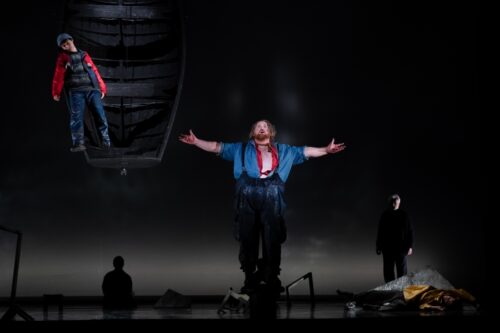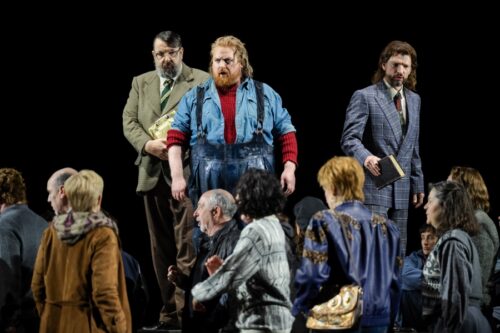 United Kingdom Britten, Peter Grimes: Soloists, Chorus and Orchestra of Welsh National Opera / Tomáš Hanus (conductor). Birmingham Hippodrome, 12.5.2025. (CP)
United Kingdom Britten, Peter Grimes: Soloists, Chorus and Orchestra of Welsh National Opera / Tomáš Hanus (conductor). Birmingham Hippodrome, 12.5.2025. (CP)

Welsh National Opera deservedly won the 2024 Sky Arts Award for Opera with their production of Britten’s Death in Venice. Their current production of Peter Grimes, Britten’s most frequently performed opera and his finest opera, will be a leading contender for the 2025 award. Britten’s music deserves a conductor with an understanding of the spontaneity and sense of purpose of the scores. Stand up Tomáš Hanus and take a bow! The Birmingham Hippodrome audience witnessed his superb direction of a score which has been described by some as laborious. Hanus was having none of this, the work moved at pace with his vast orchestra distinguishing itself with crisp brass playing. Anders Swane’s tuba foghorn effects were a constant reminder of the sombre nature of the story with the tragic deaths of Grimes’s apprentice off the Suffolk foreshore.
Yet this current WNO production is a ‘sympathetic Grimes’; there is ferocity and rage, tempered by Captain Balstrode’s (David Kempster) recognition that Grimes (Nicky Spence) needs help and support. It should not be forgotten that Britten and Peter Pears were pacifists, deciding to leave Britain in 1939 to go to the United States, before applying for recognition as conscientious objectors when they returned. But Peter Grimes is far from a celebration! In Grimes we see both a dreamer and an individual who desperately seeks success, a driven man who finds himself at loggerheads with his local community. Britten was influenced by the work of George Crabbe, another Aldeburgh resident in his letters contained in The Borough, published in 1810 – a portrayal of hardships and rural poverty.
Director, Melly Still’s collaboration with set designer, Chiara Stephenson produced uncomplicated, common-sense sets which this aforementioned rural poverty and sombre atmosphere deserves. There is nevertheless the opportunity for elements of magic and fun as Grimes and John (Grimes’s apprentice) skip across the groynes on the Aldeburgh foreshore. Equally innovative is collaboration between Stephenson and Malcolm Rippeth (lighting director) in the church service scene and the spectral disappearance and reappearance of the village congregation with the magnificent WNO chorus (all 48, singing offstage), another magic moment. Throughout the three hours, the Rippeth lighting plot offered the production the underpinning it deserved with back-projection assisting in creating images of the huge weather changes.

Change in Aldeburgh is, however, slow! Moot Hall, where the inquest into the death of a Grimes apprentice is held now houses the museum and town council; The Boar pub in Grimes has changed to the White Lion, the foreshore remains comparatively unspoilt. As landlady at The Boar, the ever-versatile Dame Sarah Connolly (Auntie) with her warm mezzo-soprano voice controls the unruly drinkers and, when necessary, the ‘mob’ when they are on the rampage, in a calm and measured way! That gossiping ‘mob’, WNO’s chorus at its best, is the force of prejudice, suspicion and cruelty towards Grimes after the inquest into the death of his apprentice. One of the few in support of Grimes is the Borough schoolmistress (Ellen Orford), who devotes time and attention to him and his plight. Sally Matthews is that schoolmistress who sings the most stunning duet with Nicky Spence. Her pivotal role is brilliantly executed, she cares for both Grimes and John, the apprentice, she whisperingly laments the difficulties Grimes faces. Whilst the drumming of Hobson (Callum Thorpe) energises the ‘mob’ as a posse, she remains a calming influence as that posse moves to search Grimes’s hut only to find nothing but a tidiness. An upturned sailing dingy hangs above the action, a constant reminder of the challenges to Peter Grimes and the lives of fisherfolk. The tuba foghorn is that other reminder of those dangers.
Nicky Spence was at his most formidable as he argues with John; he is aggressive, yet finds time to repent, though he knows he is losing control and becoming increasingly confused, some would say unhinged. It was impossible not to focus on Spence as he shares his aims to ‘make money and marry Ellen’. But as he caresses the body of the dead John, unknowingly the ‘mob’ celebrates despite the warnings of foul play from Mrs Sedley (Catherine Wyn-Rogers). Captain Balstrode’s consistent support never wanes as he insists ‘we will be there with him’. The ‘mob’ takes a very different approach and in their search for Grimes claim ‘we’ll destroy’ with a vivid tearing to pieces of an albatross, a reference to Coleridge’s ‘The Rime of the Ancient Mariner’. Ellen continues to offer her support and with Balstrode’s help believes there is hope, ‘the tide will always turn’. Spence has skills to express emotional indecision in spades; a distinctive quality of voice giving a memorable performance of a tortured maverick. Inevitably, the townsfolk of the Borough return to their daily tasks believing Grimes is drowned at sea!
This remarkable WNO production is first class in every way. Try to catch it in Milton Keynes or Plymouth – it is not to be missed! Cast, chorus, technical team and orchestra deserve another Sky Arts Award for Opera in 2025.
Clive Peacock
Production:
Director – Melly Still
Associate director – Joseph Alford
Set designer – Chiara Stephenson
Costume designer – Ilona Karas
Lighting director – Malcolm Rippeth
Fight director – Maisie Carter
Chorus master – Frederick Brown
Cast:
Peter Grimes – Nicky Spence
Ellen Orford – Sally Matthews
Captain Balstrode – David Kempster
Ned Keene – Dominic Sedgwick
Bob Boles – Oliver Johnston
Auntie – Sarah Connolly
First Niece – Fflur Wyn
Second Niece – Eiry Price
Mrs Sedley – Catherine Wyn-Rogers
Swallow – Sion Goronwy
Reverend – Jeffrey Lloyd-Roberts
Hobson – Callum Thorpe
Dr Crabbe – Helen Jarmany
John – Maya Marsh

It was a wonderful experience!
First time seeing WNO.
My third experience, Covent Garden with Peter Pears, the ENO, probably at Sadlers Wells and now, years later, the WNO. It’s a marvellous piece and I’ve been singing little phrases all week to myself as well as pondering the contemporary issues that plague us now as then, erosion, prejudice, abuse, plus others. A most memorable production.